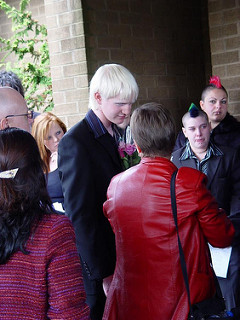
My friend's dad died several years ago but she thinks of him often; his golf hat and golf clubs are a constant reminder. She stores them where they are visible and she smiles when she sees them. A cousin wore his dad's coat the first winter following his father's death and a friend found great comfort using her mom's handbag while she grieved her death.
These stories made me think of my grandma. She was constantly in the kitchen and she always wore an apron. I wear an apron too and every time my hands reach behind me to tie the bow, I think of my grandma. And I've continued her legacy by giving every family member an apron.
These tangible reminders are what keep our loved ones close and a continued part of our lives. I was reminded of this when we celebrated my daughter's birthday at a restaurant. All grown up, I was surprised she wanted us to sing the family birthday song. The song dates back to my mom's camping days and my mom made it a part of our family's celebrations and I've passed it on to mine. My husband, daughter and I tried to sing quietly, clinking our glasses on cue. I thought how special it was that my mother's legacy is still very much a part of our lives and now that my daughter is a mother herself, she is passing it on to another generation.
Here are some ways to keep your memories alive, not just for you but for generations to come:
1. Display photographs where you can see them often, and use them as a way to share a story with other family members and friends.
2. Prepare and integrate family recipes into your daily life and holidays and let everyone know their history.
3. Share copies of your loved one's recipes. When I share a recipe from my mom, I always title it "Jean's ***," and it always gives me pleasure. And I have recipes in my personal cookbook that bear the names of my friends' loved ones.
4. Use a family heirloom, such as a serving piece, at holiday time, reminding your family of its history and all the occasions it's served.
5. Pass on family heirlooms to family members. Share the story behind the item so they will use and treasure both the item and the memory.
6. Tell stories and tell them often. Your personal stories will become part of your family's narrative.
7. Copy documents and share them with other family members to preserve and cherish your loved ones.
8. Document personal history and memories, creating a written story to be passed down to generations to come.
Photo credit: memories_fcc-rachel_zack_1600x500-1170x366.jpg
Robbie Miller Kaplan is an author who writes from a unique perspective as a mother who has lost two children. She has written How to Say It When You Don't Know What to Say, a guide to help readers communicate effectively when those they care about experience loss, available in ebooks for "Illness & Death," "Suicide," "Miscarriage," "Death of a Child," "Death of a Stillborn or Newborn Baby," "Pet Loss," "Caregiver Responsibilities," "Divorce" and "Job Loss." All titles are in Amazon's Kindle Store.









 RSS Feed
RSS Feed
